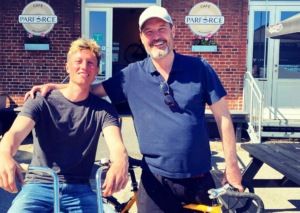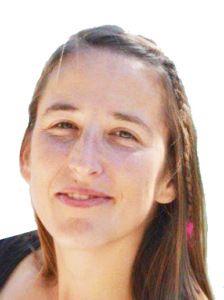Opinion
Green Spotlight: Hands that make a difference
Sibylle de Valence
This article is more than 3 years old.

More likes and more bikes needed at Cafe Parforce (photo: Hasse Ferrold)
It is a long way up – but it can become necessary if we do not want to wet our feet in the future. Flooding will become part of our everyday life unless we start doing something about our climate,” indicates a plaque on a rather intriguing bench facing the famous Copenhagen Lakes.
Hard to sit down on compared to most public benches, the seat has been raised on purpose by 85 centimetres.
It’s a reminder of what the UN Climate Panel is constantly telling us: if we keep on living like we do today, sea levels will continue to rise by up to a metre by 2100.
According to Danish researchers, the rise might even be faster: an increase by 135 cm by that time.
Benchmark for the future
“With the elevated benches, we want to give the Danes a concrete picture of what the future will be like. It is our land and thus our responsibility to act on it,” explains Lotte Lindegaard, the content director at TV2.
The Danish broadcasting company is behind the campaign in collaboration with the municipality.
As a public service media, TV2 acknowledges its responsibility to get people to think about climate challenges by making it visual and clear to all Danes.
The 15 elevated benches have been installed at various popular locations in Copenhagen, Aarhus and Odense.
Ingels’ clever angle
Initially, the benches were only due to stay for four weeks before being dismantled and reused by the sustainable furniture manufacturer GH Form, but now they’re staying a little longer. Frankly, they do fit in well with the Copenhagen landscape.
A few prominent figures have struck a pose next to them to draw attention to the good cause – a struggle in light of column inches taken by the War in Ukraine since February.
Among them was Danish architect Bjarke Ingels, who managed to bring the causes together by wearing yellow and blue sneakers.
A cycle of change
Raising awareness about climate change is one thing. Acting is another. Resilience and creativity are key to enacting change. “It is in our hands to make a difference,” Nelson Mandela once wisely said.
For Nick Zoltowski, watching powerless refugees fleeing Ukraine was his call to action.
The Englishman, who works for the United Nations Refugee Agency in Nordhavn, is tacking ongoing climate challenges head-on.
Hence the Refugee Bicycle Club was born as a virtual community at refugeebicycleclub.com and physically at the Café Parforce – “a hub for all things nice about cycling”, the website states.
Together with Birger, the man behind Café Parforce, and Laurenz, a student in software development, Nick is empowering refugees with the freedom of second-hand two-wheelers. Ideally located at the Klampenborg S-tog station, Café Parforce is the perfect place to spend their free time fixing used bikes to be donated.
More likes, more bikes
Four-year-old Mia was one of the first children to get a refurbished bike. When she fled her home in Odessa a few weeks ago, she could only ride her balance bike. It’s in Denmark that she has learned how to cycle without stabilisers.
“The emotions were amazing: she had a desire to go right away,” her mother recounts thanks to Google Translate.
Nick has many more stories like this one to share. With 116 requests for 179 bikes on his Excel file, he calls for “more likes and more bikes”.

About
Sibylle de Valence
Sibylle is a French journalist, columnist and author who writes for a variety of French, English and Italian language-publications, specialising on the green transition. Having lived and worked in San Francisco, Milan, Berlin, Rome, Calgary and Paris, she speaks five languages. Follow her on Instagram at sibdevalence










































